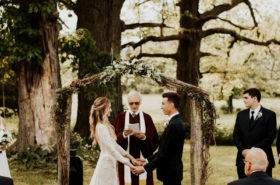You’re probably reading this because you have some control issues, huh? You need to be the creative director of your own wedding and just don’t trust that someone else could do it justice. I get it, because I was you with our wedding. I wanted to be hands-on, elbow-deep in my own magical day. Honestly, I have no regrets about that. I cherished that year more than any other in my life thus far.
That being said, it’s a dang big undertaking! It’s a huge thing to do by oneself and even more difficult because its everyone’s first time. No pressure, but you only get one shot…
Lucky for you, there are so many resources out there to help keep you in line and planning at a semi-professional level in no time. You just have to know where to look and when to hire someone for the things that aren’t your strong suit.
Get emails when new posts come in, so you can read on the go… we all know wedding planning makes you crazy busy, so I promise I won’t add to it by spamming you!
My hope with this post was to compile all the major things you need to know before beginning planning and need to remind yourself throughout. I think it’s helpful to start with this before getting into the many details of your reception, ceremony, etc.
1. Stay organized
This is imperative. It’s 99% the reason I created this blog in the first place. I wanted to create the Ultimate Wedding Planning Binder, because I felt its absence when I was planning. I tried to stay organized, but didn’t feel I had all the tools it took to do that.
Below are the tools I think you need in addition to Ultimate Wedding Planning Binder, which I truly believe is the best out there or wouldn’t have created it and sold it! These tools are affiliate links, so purchase from here or wherever you’d like, I just wanted to visually lay them out for you and this was the easiest way:
Digital tools to get organized on:
- Gmail: I’d recommend getting a new Gmail address specifically for wedding planning. That way you know exactly where to go for all wedding communications and because that platform is so easy to use, mark as priority and organize. You can have Gmail folders for all sorts of things (like contracts and potential vendors).
- Google Drive: This Gmail will be connected to your drive where you can create folders for each vendor, store everything- from notes to contracts to your guest list and share with whoever you’d like. Your fiancé can be connected or maybe your mom- it’s much easier to let the right people have access than constantly be sending them emails with attachments.
- Google Calendar: I’m a paper person, so it’s hard for me to keep a digital calendar BUT I think you should at least have a digital version for your wedding planning appointments and important reminders. That way, you won’t forget when you have to pay deposits by, when your florist consultation is, etc. Again, this can be synced with whoever goes with you to everything (mom, fiancé, MOH, etc.).
- Your desktop: My recommendation would be to keep everything on the drive. I lost several things because I just threw it on my desktop and could never find it again. Also, God forbid your computer dies during the planning and you lose everything…
- Pinterest: That’s right, this is a straight up TOOl for you. Whether it’s secret or visible, make sure you have at least one board that serves as your mood board for your big day. You’ll be seeing things all over the internet that you are inspired by and want to recreate, so you’ll need a place to store them, and I truly think this platform is the perfect for that. Feel free to divy up the board into “sections,” so you can easily see what you saved in regards to the reception, ceremony, your dress, etc. Learn how to create sections here.
- Instagram: If you’ve already begun following other wedding blogs or wedding photographers on Instagram you’ll see the same thing: a million photos you’re in love with and that give you ideas for your wedding. I would create a “collection” for your wedding and just save those images onto that, so you can reference them later. Learn how to create collections here.
2. Research
Like anything you’re just doing for the first time, there is going to be a bit of a learning curve. There are things about the planning process that just won’t register until you do them, but you may as well get as prepared as you can. The binder has six pages of specific articles I liked about specific aspects of wedding planning, but below are the main sites I would recommend you do your wedding research on:
- Obvi, The Internet’s Maid of Honor (so many shameless plugs today, sorryyyyy)
- Pinterest for everything you need to know ever
- The Knot (mag + website)
- Brides (mag + website)
- Real Simple Weddings
- Bridal Guide
- Wedding Wire
- Zola blog
- Here Comes the Guide
- Martha Stewart Weddings (mag + website)
- Woman Getting Married
- A Practical Wedding
- Bridal Musings
Side note: I usually consult more than one per subject, because I’ve personally never found the bigger websites/magazines to be perfectly complete.

3. Determine priorities for each month
I’ll say it in every blog post, but whatever the priorities are for your fiancé and you, that’s what you should start with here. Determine when you need to book those vendors by, and move backwards to when you need you to start searching and when you need to set up appointments for. Just work backwards from all those big things and make them the “must-do’s” for each month.
I try to help with that in my totally free monthly email where I send you the to-do list and all the usual big things you have to do and when every 30 days. It comes with a free printable where you can add in #4 as you go. This, or just purchasing them all at once here, may help you get started. I know it’s hard to know right away when everything needs to be done by, so feel free to research and ask for help. Getting things done on time is one of the biggest things you have to manage, so this priority list will be a big deal in the coming months.
4. Add in “the little things”
After completing the big things, you might get this unsettling feeling like surely there is more that you’re just not thinking of. Well, my friend, you’re right. There are a hundred “little things” that will pop up along way. You’ll find these things through further research and planning or just by dreaming up new things you want to add in. These things will come to you randomly on a drive somewhere or at a vendor meeting and it’s import to always have a notebook on hand to jot it down ASAP. Then, go home, decide on the timing you need to complete the task and schedule it out.
5. Create a schedule
This goes hand-in-hand with #3 and #4, but you need a master schedule with these things on it. One that dates and schedules out every step of every task. The more detailed, the less stress you’ll have in the future. Every new thing that pops up along the way will be added to this schedule, so make sure it’s formatted in a way that best suits your productivity.
Here are a few ways I envision this master schedule working for different people:
- Use the Ultimate Wedding Planning Binder or the Monthly To-Do List packets to schedule things by month. Staple them all together in order or hole punch to put in its own section of your binder. Keep at least one blank sheet in between the ones with text on them, highlight tasks as they’re completed and throw away months as they go by.
- Use a paper or white board calendar to schedule this out. Use stickers to mark things like appointments or payment due by and then mark down things like “look for a florist” on specific weeks. Sticky notes are also great for paper calendars, because if things change you can easily alter instead of having to scratch it out.
- Use a Google Calendar by inputing all these things and setting reminders when necessary.
6. Use the right tools
Again, the internet is a gold mine when it comes to free tools. I would look up whatever you’re looking for and shop around. If you really want it to be great, you may have to invest, but if you’re looking for the free way out… I don’t blame you!
- Wedding seating chart tool
- Wedding guest list manager
- Wedding day timeline tool
- Wedding cost estimator
- Wedding Budget Spreadsheet

7. Be decisive
You’ve got to be the kind of person that can make decisions and not feel iffy about them later on. You call the shots, and you should be confident in them after you make them. The longer it takes you to make a decision, the more difficult it is on you later on.
8. Consult someone for a second opinion
That being said, don’t get too hasty. I found some of the wedding industry (like any other industry) to be a little… I guess “fake” is the word I’m looking for. They sound invested, but of course they’re not really. They want to make money and get their jobs done. I think that’s totally understandable and, again, is true in any industry, but if you’re too trusting (I can be), this can mean you make poor decisions.
If I could advise anyone on choosing vendors, I’d say personality is as important as it’ll feel in that moment. You need to be able to work with them- silent and boring, does not an easy work-relationship make, but what’s most important is that they’re capable of doing what you’re hiring them to do. They need to mesh with your vision, not necessarily with your personality. After multiple friendly emails and reading reviews about how nice they are, you’ll be sold. That’s not really what it’s about though, right? I think it’s more important to dive deep into the reviews about the actual work they produced for their clients and to see the photos of that work. I’d even go so far as to say, look for the work that they’re not outright showing you. I say this just because you don’t want to see they’re five best weddings ever… you want to see that on average they’re capable of what you’re looking for.
Once you gather all of this intell, share it with your fiancé and a friend or family member that you trust. Maybe someone that has had their wedding recently as well. Get their feedback about what this vendor can do without ever having communicated with the vendor themselves. They can give an honest review and help you make the right decisions.
9. Read the small print
I found that after the first couple of vendors we booked, I started skimming contracts. That’s obviously irresponsible and seems dumb, but honestly they get overwhelming and dull real quick. It’s easy to let that happen. I’d make sure to read and reread contracts, highlighting all the details and making sure you’re truly getting what you think you are.
From insurance policies to additional fees, you need to know upfront what those are so you can compare them to other vendors in the same field. Two vendors may be at about the same price point, but if you look closely one may have additional fees for how long they’re on site or gas to get to the venue. These things aren’t necessarily dealbreakers, as they’re pretty standard, BUT it’s just important that you know the full picture before signing on.
I included a lot of the questions and info you need to know from each vendor in this packet. That way you can ask them when you meet them, not when you’re going to sign a contract and have already distanced yourself from other options.
10. Take breaks
It’s going to feel like every free moment of your life needs to be spent planning and than every conversation with your fiancé, mom and best friend has to revolve around your wedding. Make it a point to step away. Pick a day of the week, you won’t consciously plan or talk wedding. Put aside wedding planning for a couple hours to binge watch TV. Delete the Pinterest app from your phone for three days.
Step away. Your mental health and nearly everyone around you will thank you.
11. Keep your fiancé involved
Ask them upfront before you begin what they expect when it comes to wedding planning. Are they a “I want to help plan” person or more of a “whatever you want, honey” person? You may think you know, but you won’t really until you ask. Needless to say, it’s there day too and they have a right to be as invested as they’d like. Don’t be that bridezilla that forgets about the marriage, peeps.
Even if he/she says they don’t care, keep them involved on the big decisions. “Babe, I’m thinking about this DJ. He has great reviews- check them out. What do you think?” <– That should be the minimum for every single vendor you dish out for.

12. Work ahead
One of the major benefits of having a wedding planner is that they know when everything needs to get done. They don’t have to work way ahead, because they have the timing down. You will be fumbling with the timeline the whole time, so it’s best to just do whatever you can, as early as you can. Don’t stress over it, but just keep moving onto the next task as one gets completed. That way when the inevitable “little things” begin popping up (this especially happens in the last three months), you can easily add them in without overwhelm.
13. Be tough and negotiate
When you’re planning your own wedding, you don’t have someone to do this on your behalf. You have to be there person that haggles prices and tries to get deals (don’t go crazy, but most vendors have some leeway). You also have to be the person that firmly asks for what you want from who you hired. They are the professionals and you hired them because you thought they were capable, but if things are falling through the cracks or not happening like you discussed- you have the right to ask for a change. You’re spending way too much money to get something you hate just because you were too scared to stand up for yourself. There’s ways of having these discussions without offending or pissing off your vendors, but as the event planner, you need to keep it all in line.
14. Stay focused on what’s important
Again, this has become a signature on all my posts, but despite being your own planner you are first and foremost becoming a wife. This should be an exciting time for you, so stay connected to that feeling and love for your fiancé throughout. Go on dates without talking about the wedding, and plan your future family!
15. Be as laid-back as possible
I hate to say this, but your wedding’s not going to be perfect. Things will go wrong, and you will get frustrated and occasionally stressed. The key is not to think these things will never happen, but instead to try your hardest to remain calm, cool and collected in these moments. You freaking out only ruins your own experience. It will be hard and sometimes you’ll slip on on this, but try your best to keep a laid-back attitude ESPECIALLY when the planning comes to an end.
16. Delegate to family/friends
Every step of the way, you will find yourself needing help. I struggled a lot because I lived in NYC while I planned our Florida wedding. The good thing was I had plenty of family members in Florida that were willing to run little errands or keep their eyes open for specific decor pieces for me. A lot of people will tell you they’re willing to help you with whatever you need. Likely, they mean that, and you should ask for it. Think about how you would feel if your best friend asked you to help her with an errand for her wedding. Personally, I’d feel honored and appreciate that she wanted to include me in this exciting time. That’s how your friends and family feel, so you should not feel like a burden for delegating to them.
If you do not hire a day-of planner who will sort out the delegations with you in advance and remind the family/friends of what they’re supposed to do, make sure you do this for day-of. You should have every aspect delegated, from who will deal with vendor questions to who will make sure the boys leave for the church on time. You shouldn’t have to oversee or do anything. As long as you split this up and make it little tasks for multiple people, it won’t interfere with their time either. Just don’t delegate to one person, because that one person will likely have a terrible time trying to keep everything in order and miss your wedding.
17. Triple check with vendors
In order to avoid misunderstandings, make sure you always triple check with your vendors. Keep a record of all the questions you have for them and, if it’s not super timely, save them all for one big email, phone call or meeting. My guess its they probably don’t want to hear from you every day, but are happy to clear things up with you every few months. Keep these vendor questions in a document/vendor on your drive or written down in a specific folder. Also, it’s good to just summarize with your vendors what you expect from them and make sure that’s their plan as well. Sometimes, one party will assume the other party does things a specific way and won’t find out until it’s verbalized. Like any other work relationship, communication is so important. Don’t be that overly needy bride, but definitely get your questions answered.

18. Create sheets + timelines for everyone
Again, this is where a day-of/month-of planner is so worth it. You’ll want contact sheets and timelines to give out to your bridal party, vendors and family/friends you’ve delegated to. This will help keep everything rolling and the information in one safe place for whenever people need to reference it in a pinch.
19. Make sure everything’s in place for day-of WELL in advance
Don’t leave packing your suitcase, getting your hair done or anything else for the week of. Try your hardest to get this accomplished two weeks before the wedding. Not only does this leave you time to remember the inevitable things you’ll forget to do, but also, I firmly believe that a week before your wedding should be about spending time with family and friends. So many people will be in town and wanting to spend time together. If you have 50 tasks for that week, you’ll have to miss out on incredible memories.
20. Hire a day-of
I just don’t think you should do a wedding without one. It’s a personal opinion, but my guess is that the pro’s would agree…



